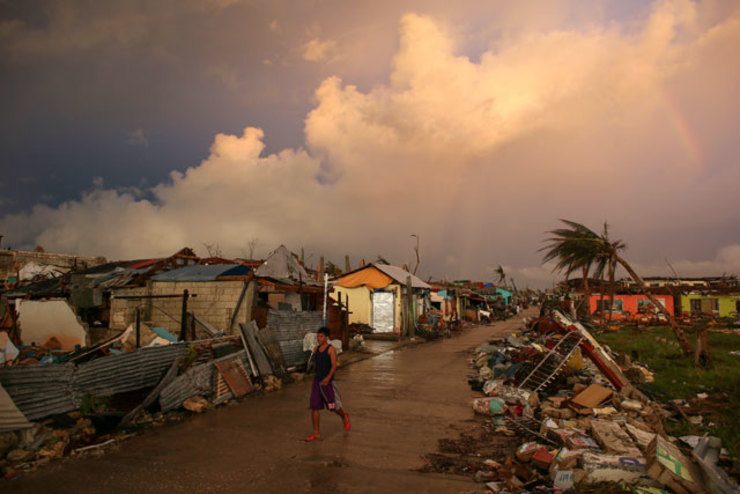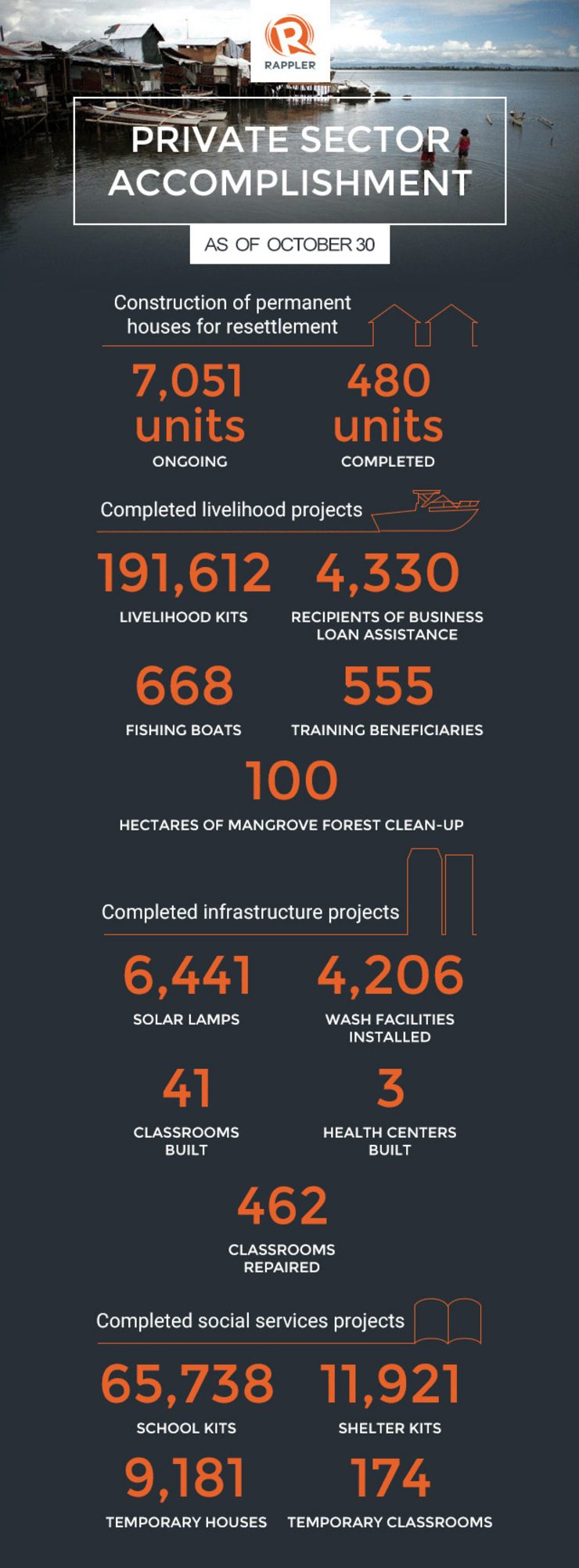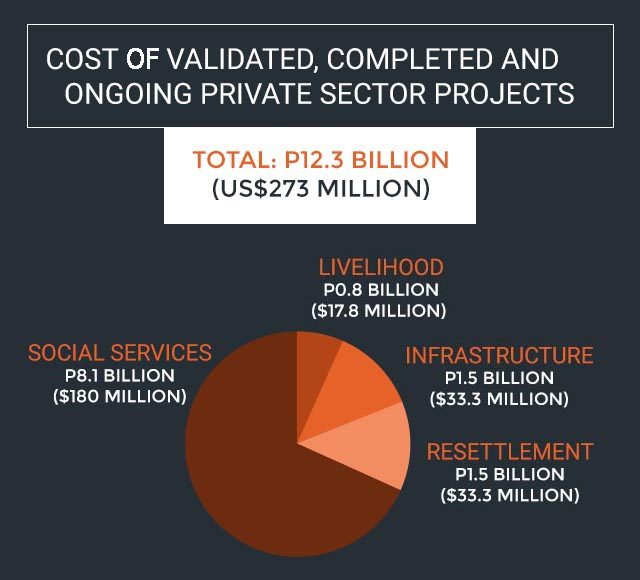SUMMARY
This is AI generated summarization, which may have errors. For context, always refer to the full article.

This compilation was migrated from our archives
Visit the archived version to read the full article.
MANILA, Philippines – Private companies, private foundations, and non-governmental organizations have become indispensable partners of the government in its campaign to “build back better” after Super Typhoon Yolanda (Haiyan).
A year since the calamity, these groups, collectively known as the private sector, have been the fastest implementors of rehabilitation projects. (TIMELINE: The good and bad news #AfterYolanda)
Government data shows that, though private sector-committed funds are equivalent only to 15% of government-committed funds, more than half of it has already been spent on completed or ongoing projects.

Private sector commitments totaled P26.6 billion (US$591 million) as of September 30, according to the Office of the Presidential Assistant on Rehabilitation and Recovery (OPARR).
As of the said date, P12.3 billion ($273 million) of it has already gone to completed or ongoing projects.
An October 30 update from OPARR pegged the total money spent by private sector at P12.98 ($288 million).
This amount pertains only to private sector donations or projects coordinated with the OPARR. The agency expects the cost of unreported projects to be “meaningfully significant.”
Completed projects of the private sector as of September 30 include:
- 280 permanent houses
- 4,330 recipients of business loan assistance
- 41 classrooms
- 8,681 units of temporary houses
The government, meanwhile, promised around P167.9 billion ($3.7 billion) to fund its rehabilitation master plan, finally approved by President Benigno Aquino III on October 30.
Because of the recent approval of the plan, the government has “barely started” spending the budget, OPARR Undersecretary Danilo Antonio told Rappler.
The Department of Budget and Management reports that it channeled P47.12 billion to various national government agencies using allocated funds under the regular budgets of these agencies.
However, no comprehensive tally has been made on how much of these funds were already used by the agencies on rehabilitation works.

The private sector is able to get the work done faster because it is not burdened with the government bureaucracy that comes with handling sensitive tax payers’ money, said Antonio.
“They are faster because they have clearer processes, they know what they’re doing and the commitment level is very high. There is no constraint. The moment they say ‘let’s go,’ they will go,” he said.
One step that has led to many bottlenecks for government projects is the bidding requirement, which private companies can bypass or fast-track because of a ready list of trusted suppliers and contractors, Antonio added.
Partnering up
OPARR is currently working with 20 private companies, 21 private foundations, 15 local NGOs, and 17 international NGOs.
Complete list of private sector partners working with OPARR as of September 30, 2014 (click on the private sector group type to see the list):
- Energy Development Corporation
- Mondelez Philippines
- Ayala Land
- Price Waterhouse Coopers
- BDO-Beiersdorf Philippines
- L’Oreal
- Globe Telecom
- Philippine Phosphate Fertilizer Corporation
- PhilAm Life
- JG Summit Holds Inc
- Magsaysay Shipping
- Nickel Asia Corporation
- Peregrine
- International Container Terminal Services Inc
- Jollibee
- Philippine Rural Reconstruction Movement
- Reyes Cutters
- Yuchengco Group of Companies
- Assumption Alumni Association
- INJAP Investment Inc
- ABS-CBN Lingkod Kapamilya Foundation Inc
- Ayala Foundation
- GT-Metro Foundation Inc
- BDO Foundation
- Lego Foundation
- Cemex Foundation
- Consuelo Foundation
- One Meralco Foundation
- Philippine Disaster Recovery Foundation
- PLDT-Smart Foundation
- Alagang Kapatid Foundation
- Ramon Aboitiz Foundation Inc
- SM Foundation
- The OML Center for Climate Change Adaptation and Disaster Risk Management Foundation Inc
- VICSAL Foundation
- Zuellig Family Foundation
- Barcelona Foundation
- PACAP Yolanda-The Asia Foundation
- SM Foundation-BDO Foundation
- BDO Foundation-Beiersdorf
- UP Planades
- Bayan Academy
- Center for Agrarian Reform and Rural Development
- Foundation for the Philippine Environment
- Gawad Kalinga
- Habitat for Humanity
- Mercy Corps
- Order of Malta (Philippines)-Malteser International
- Philippine Business for Social Progress
- Partnership of Philippine Support Service Agencies
- Foundation for a Sustainable Society
- Red Cross
- Yes Pinoy Foundation
- ACTED
- Philippines Tropical Forest Conservation Foundation Inc
- Catholic Relief Service
- Lutheran World Belief
- PLAN International
- Secours Populaire Francais
- Vision Help International
- World Wide Fund for Nature
- Oxfam
- Tzu Chi
- Arche Nova
- ChildFund
- Children International
- Caritas Internationalis
- SOS Children’s Villages
- Handicap International
- ACF International
- Save the Children
- World Vision
List of development partners and their adopted LGUs as of October 6, 2014 courtesy of OPARR:
| PROVINCE | DISTRICT | DEVELOPMENT PARTNERS |
| Leyte | Tacloban (1) | International Container Terminal Services Inc, Bloomberry Cultural Foundation Inc |
| Leyte | Tacloban (2) | PLDT-Smart Foundation |
| Leyte | Palo | Metrobank Foundation, GT-Metro Foundation Inc |
| Leyte | Rest of 1st District | INJAP Land Corporation |
| Leyte | 2nd District | ABS-CBN Lingkod Kapamilya Foundation Inc, Ayala Foundation |
| Leyte | 3rd District | |
| Leyte | Ormoc/Kananga | Energy Development Corporation |
| Leyte | Rest of 4th District | Energy Development Corporation, RCBC |
| Leyte | 5th District | ABS-CBN Lingkod Kapamilya Foundation Inc, Ayala Foundation |
| Biliran | Lone District | |
| E. Samar | Guiuan/Salcedo | Ayala Foundation, Consuelo Foundation, Nickel Asia Corporation |
| E. Samar | Rest of Lone District | PLDT-Smart Foundation, Ayala Foundation, ABS-CBN Lingkod Kapamilya Foundation Inc, Vicsal Foundation, Aboitiz, Metrobank Foundation, GT-Metro Foundation Inc, Assumption Alumnae Association |
| Samar | 2nd District | ABS-CBN Lingkod Kapamilya Foundation Inc, Consuelo Foundation |
| Cebu | 3rd, 5th Districts | VICSAL Foundation |
| Cebu | 4th District | Aboitiz |
| Negros Occ | 1st-3rd Districts | Ayala Foundation |
| Aklan | Lone District | Globe Telecom |
| Antique | Lone District | |
| Capiz | 1st District | PLDT-Smart Foundation |
| Capiz | 2nd District | PLDT-Smart Foundation |
| Iloilo | 2nd, 3rd District | |
| Iloilo | 4th District | JG Summit Holdings Inc |
| Iloilo | 5th District | Ayala Land |
| Palawan | 1st District |
Getting the private sector more involved in its initiatives was one of OPARR’s first order of business.
On January 7, 2014, a month after the agency was created, rehabilitation czar Panfilo Lacson and Antonio invited some of the country’s most powerful businessmen to a “grand commitment or pledging session” in Solaire Resort Hotel.
On that night alone, they were able to get the companies to “adopt” more than half of the 171 cities and towns in the Yolanda corridor.
Antonio recalls the disorderly state of affairs that night.
“We were so unorganized that we forgot to take souvenir photos or videos of the event. We had Manny V Pangilinan, Jaime Zobel de Ayala, Tessie Sy Coson, Ricky Razon, Endika Aboitiz seated together in one table. Not even a group photo!”
Since then, private sector groups have become either development partners (those which adopted LGUs) or sector partners (those which are helping with sectors of rehabilitation, such as resettlement, livelihood, health, spread across any number of LGUs).
But the private sector had jumped into Yolanda relief efforts even before OPARR existed.
SM, one of the first private companies to publicly pledge donations for Yolanda recovery, had been preparing food packs two days before the storm’s first landfall.
Two days after, they had already sent out 50,000 food packs for distribution, SM Investments Corporation Vice President for Corporate Communications Marie Therese Necio told Rappler.
The quick initiatives of the private sector brought them on the ground, making them early allies of OPARR in assessing rehabilitation needs, said Antonio.
“We had no organization, but we needed to find out what was happening on the ground. The various NGOs and private groups were already on the ground doing relief work so more need to convince them to help,” he said.
Choosing communities to adopt
Some private groups involved in early relief efforts eventually committed to helping out in the rehabilitation phase by making pledges during the January 7 gathering and the days after.
Initially, private sector groups were paired with needy LGUs based on convenience.
“Most of them chose areas where they were organizationally present already, for ease of implementing their donation advocacies. Those who came later chose from the remaining unadopted areas,” explained Antonio.
Companies “went where they were more comfortable.” For instance, the Gaisanos and the Aboitizes, who hail from Cebu, were quick to sponsor Cebu.
Some businessmen chose areas where they had particular connections to. Finance tycoon George SK Ty of the Metrobank group became a banker with the help of the Pedrosa family from Palo, Leyte.
“Therefore, he took Palo because there is sentimental attachment. And they’re close to the mayor,” said Antonio.
Partnering with the private sector has been very effective so far, Antonio said. Private sector has done much to fast-track rehabilitation efforts. The quality of their projects also tend to surpass government standards.
Housing constructed by Ayala Land, for instance, appear to cost more than the National Housing Authority (NHA)-standard housing, he said.
“Some companies can get their contractors to do it cheaper but keep the same quality at a lower cost.”
The ‘opera conductor’
OPARR doesn’t impose strict requirements on private sector since their contributions are on a purely voluntary basis. But OPARR does ask them to send updates at least once a month.
OPARR tracks the reports then deploys its personnel to validate the reported accomplishment on the ground, said Antonio.
An online platform that will centralize all private sector updates and other rehabilitation efforts is expected to be activated this November.
Called eMPATHY (electronic Monitoring Platform and Transparency Hub for Yolanda), it was in fact developed with the help of PLDT and Smart, said Antonio.
For many of the private sector groups, the partnership has also been fruitful. The companies interviewed by Rappler all spoke of the warm hospitality of the LGUs and the good working relationship with OPARR.
Necio of SM described OPARR as an “opera conductor” guiding private sector to where the needs are greatest.
For instance, PLDT-Smart Foundation, currently a development partner for Tacloban, is being asked by OPARR to sponsor an un-adopted town receiving less aid.
As for the distrust in some groups for the profit-driven nature of private companies, SM’s Necio says corporations deserve the benefit of the doubt.
While companies are out to make their businesses grow, the benefits need not exclude the rest of society, in this case, the Haiyan-hit community, she said.
“Some [companies] have really good intentions. Because it’s in the business units’ best interests to move these communities and their economies forward.”
Despite the accomplishments, much is left to be done. There are still 54 cities and towns that lacked a development partner as of October 8, according to OPARR.
| PROVINCE | CITIES OR MUNICIPALITIES W/O A DEVELOPMENT PARTNER |
| Leyte | Calubian, Leyte, San Isidro, Tabango, Villaba, Abuyog, Mahaplag, Baybay City, Javier (Bugho) |
| Southern Leyte | Silago, Maasin, Anahawan, Libagon, Sogod |
| Biliran | Almeria, Biliran, Cabucgayan, Caibiran, Culaba, Naval |
| Eastern Samar | Balangkayan, General McArthur, Hernani, Quinapondan, Llorente, Maydolong |
| Samar | Daram, Talalora, Villareal |
| Antique | Barbaza, Bugasong, Caluya, Culasi, Laua-an, Libertad, Pandan, Patnongon, San Remegio, Sebaste, Tibiao, Valderama |
| Iloilo | Alimodian, Badiangan, Bingawan, Cabatuan, Calinog, Janiuay, Lambunao, Maasin, Mina, New Lucena, Pototan, Zarraga |
| Dinagat Island | Loreto |
– Rappler.com
For Rappler’s full coverage of the 1st anniversary of Super Typhoon Yolanda (Haiyan), go to this page.
Add a comment
How does this make you feel?
There are no comments yet. Add your comment to start the conversation.